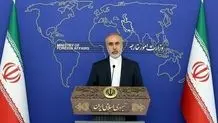Former UN weapons inspector:
Iran playing long game in its dealings with Israel
Former US Marine Corps intelligence officer urged observers to look beyond Israel and the United States’ framing of Iran’s retaliatory strike, noting Tehran was able to successfully deal damage to Israeli military assets.

MEHR: Former US Marine Corps intelligence officer urged observers to look beyond Israel and the United States’ framing of Iran’s retaliatory strike, noting Tehran was able to successfully deal damage to Israeli military assets.
Former United Nations weapons inspector Scott Ritter stressed that Iran is playing the long game in its dealings with Israel, carefully calibrating its actions to restore deterrence against the country rather than concerning itself with world opinion, Sputnik reports.
The former US Marine Corps intelligence officer offered the analysis on Sputnik's Fault Lines program Monday, challenging the perception that Israel is in a stronger position after intercepting most of Iran’s retaliatory strikes over the weekend.
“The point is prior to this Israel had established a dominance – I'll call it deterrence dominance,” claimed Ritter. “Meaning that, from an Israeli perspective, nobody should ever dare attack Israel, that Israel has let it be known that if you attack Israel, there will be a ten-fold response, that your life would end, it would be horrible, you can't do it. And, for the most part, people didn't attack Israel.”
“And so Israel had become very arrogant, had become sort of the neighborhood bully writ large,” he explained. “And this is why Israel was bombing Syria with impunity, striking targets in Lebanon with impunity, striking targets in Iraq with impunity.”
Israel frequently bombs Syrian airports and other infrastructure and has been illegally occupying the country’s Golan Heights territory since 1967. In 1982 the Israeli military bombed the Lebanese capital of Beirut so aggressively the US President Ronald Reagan referred to the event as a “holocaust,” hurting the feelings of Israeli Prime Minister Menachem Begin.
Observers also suggest Zionist opposition to Iraqi President Saddam Hussein played a role in the United States’ decision to invade the country and remove him from power in 2003. “It's very clear: Israel had the most influence in this and more so since we know how the Israelis were running into the Pentagon consulting with Rumsfeld and all those guys without even having to show any badge or anything,” former CIA Analyst Ray McGovern claimed on Sputnik’s The Critical Hour program recently.
آخرین اخبار Iran را از طریق این لینک پیگیری کنید.




